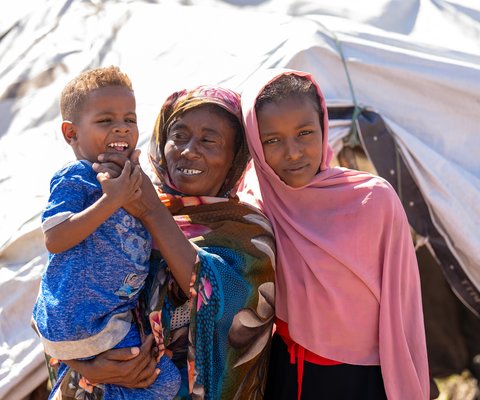Research
Search research reports
-
Research
Mitigating the Risks of Private Sector Involvement in the Electricity Sector in Sub-Saharan Africa
Sub-Saharan Africa (SSA) faces an electricity access crisis, with over 600 million people lacking access to reliable power. Chronic underinvestment, institutional fragility and fragmentation, and operational inefficiencies have rendered many state-run utilities incapable of sustaining reliable service delivery, let alone meeting rising demand. In response, governments often running on budget deficits and influenced by international financial institutions have embraced private sector participation (PSP) as a means to mobilise capital, improve operational efficiency, and accelerate electrification. Yet the outcomes of PSP across SSA are mixed, raising questions about its effectiveness, equity, and long-term sustainability.
This study undertakes a comprehensive, mixed-methods analysis of PSP in SSA’s electricity sector. It maps the evolution and extent of private sector engagement across generation, transmission, and distribution; quantifies its prevalence; and assesses its impact on six core performance indicators: financial viability, access, affordability, quality of supply, operational efficiency, and decarbonisation.
The findings of this study affirm that PSP, when embedded within robust governance and regulatory frameworks as well as transparent procurement mechanisms and coherent sector planning, can contribute positively to power sector performance. However, these gains are not automatic. The strongest correlations between PSP and performance are observed in countries where governance is credible, regulatory agencies are functional, and policy environments are stable. Conversely, in contexts where institutions are weak, PSP has often produced limited or even adverse outcomes, such as overcapacity, fiscal strain, high tariffs, and social inequities. In summary, PSP can be a valuable tool for accelerating power sector transformation, but only when it is thoughtfully designed, responsibly governed, and firmly aligned with the public good. Further, sustainable electrification requires not just more investment, but smarter, fairer, and more accountable systems that prioritise resilience, equity, and long-term development.

-
Research
UNEQUAL: The rise of a new American oligarchy and the agenda we need
This past year has been indelibly shaped by concentrated wealth and power. The 10 richest U.S. billionaires got $698 billion wealthier, and the arrival of the world’s first trillionaire grew more imminent. The Trump administration—largely with the support of the Republican-controlled Congress—has moved with staggering speed and scale to carry out a relentless attack on working-class families, while enriching the wealthy and well-connected.
How did the country get here? The story does not begin in 2025. Oxfam’s UNEQUAL provides a snapshot of U.S. economic inequality today, and looks at the trends in recent decades that have culminated in contemporary extremes that are corroding U.S. democracy and causing hardship for many millions of people. The report examines the influence of concentrated wealth over politics, and how policymakers’ choices on tax, labor, social protection and other issues contributed to the growing divide between the very wealthiest and much of the country. It sounds the highest alarm about what comes next and sets out an agenda to turn the tide and reverse harmful inequality, calling on policymakers to back the demands of workers, movements, and communities to deliver for ordinary people.
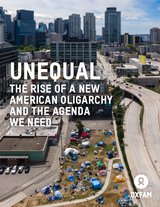
-
Research
Beyond Rhetoric - Feminist Leadership for a Transformative Women, Peace and Security Agenda at 25
Case Studies from Colombia, the Democratic Republic of Congo, the Occupied Palestinian Territory, and South Sudan
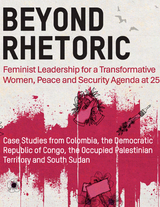
-
Research
Towards Gender-Transformative Action on Super Pollutants
The guidance document, Towards Gender-Transformative Action on Super Pollutants, produced in partnership with Oxfam America, identifies gender-differentiated impacts of super pollutants by sector - from gender-related exposure, vulnerability, resources, and decision-making capacity. It shows how women and marginalized groups are disproportionately affected by these pollutants, facing greater health risks, care burdens, and exclusion from decision-making, while also playing vital roles in frontline solutions.
Moving from how the six sectors tend to be organized today, the guidance provides policy-relevant analysis on reshaping sectors based on deeper analysis of gendered considerations and greater participation of women, in particular from low-income and marginalized groups.
Taken together, these point to recommendations which policymakers and civil society can apply towards promoting gender-sensitive and gender-transformative change, alongside sector specific recommendations to be integrated into super pollutant reduction projects on the ground.
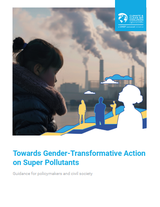
-
Research
Best States to Work in the US 2025
The Best States to Work Index, now in its seventh edition, is an index of 27 policies across three themes - wages, worker protections, and rights to organize - for all 50 states, the District of Columbia and Puerto Rico. This index was born in 2018 to analyze which states were stepping into gaps left by federal inaction to protect low wage workers and working families. In 2025 we have seen many states follow the lead of the federal government and roll back hard won gains, including a weakening of child labor laws, revoking paid sick leave, and even taking unionization rights away from public workers like teachers and firefighters. The report is meant to highlight and celebrate those states seeking to proactively support workers, while encouraging a race to the top for those states at the bottom. The policies tracked in our index are either nonexistent or insufficient at the federal level, so this report is also meant to provide a blueprint for federal and state policymakers to improve the landscape for all workers.
Click here to explore the interactive map.
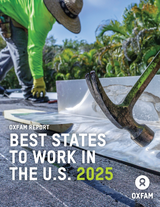
-
Research
Defining and Assessing Transformational Climate Change Adaptation: A framework for application to agri-food projects
This discussion paper proposes a framework of four indicators of transformational adaptation – the breadth and depth of change, the intention to achieve transformation, scale and sustainability - and provides a framework to apply these indicators to four types of interventions in agri-food systems.
The paper was co-commissioned with Catholic Relief Services.



